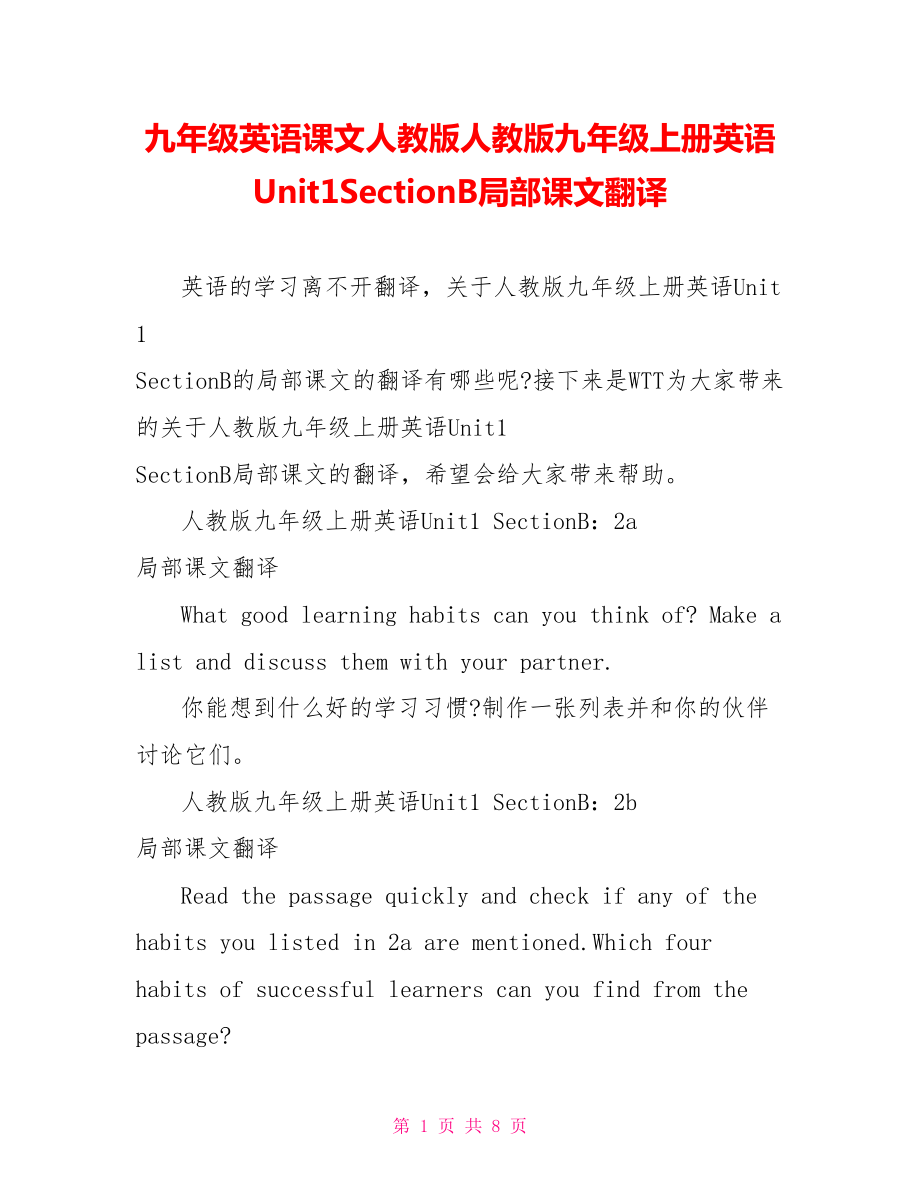《九年級(jí)英語課文人教版人教版九年級(jí)上冊(cè)英語Unit1SectionB部分課文翻譯》由會(huì)員分享���,可在線閱讀,更多相關(guān)《九年級(jí)英語課文人教版人教版九年級(jí)上冊(cè)英語Unit1SectionB部分課文翻譯(8頁珍藏版)》請(qǐng)?jiān)谘b配圖網(wǎng)上搜索����。
1、九年級(jí)英語課文人教版人教版九年級(jí)上冊(cè)英語Unit1SectionB局部課文翻譯
英語的學(xué)習(xí)離不開翻譯��,關(guān)于人教版九年級(jí)上冊(cè)英語Unit1 SectionB的局部課文的翻譯有哪些呢?接下來是WTT為大家?guī)淼年P(guān)于人教版九年級(jí)上冊(cè)英語Unit1 SectionB局部課文的翻譯��,希望會(huì)給大家?guī)韼椭?
人教版九年級(jí)上冊(cè)英語Unit1 SectionB:2a 局部課文翻譯
What good learning habits can you think of? Make a list and discuss them with your partner.
你能想到什么好的學(xué)習(xí)習(xí)慣?制作一張列
2�、表并和你的伙伴討論它們。
人教版九年級(jí)上冊(cè)英語Unit1 SectionB:2b 局部課文翻譯
Read the passage quickly and check if any of the habits you listed in 2a are mentioned.Which four habits of successful learners can you find from the passage?
快速讀這篇文章����,檢查一下是否提到了你在2a中列出的習(xí)慣���。從這篇文章中你能找到成功的學(xué)習(xí)者的哪四個(gè)習(xí)慣?
USING DICTIONARIES
This can help you
3、 find the definition that matches the conte____t of the word in the te____t.
這能幫助你找到與課文中單詞的上下文相配的釋義�����。
How Can You Bee a Successful Learner?
你如何成為一名成功的學(xué)習(xí)者?
Everyone is born with the ability to learn.But whether or not you can do this well depends on your learning habits.Research shows that success
4�、ful learners have some good habits in mon.
每個(gè)人學(xué)習(xí)的才能與生俱來,但是你能否做好取決于你的學(xué)習(xí)習(xí)慣����。研究說明成功的學(xué)習(xí)者有一些共同的好習(xí)慣。
Creating an interest in what they learn
建立對(duì)所學(xué)內(nèi)容的興趣
Studies show that if you are interested in something, your brain is more active and it is also easier for you to pay attention to it for a long time.Go
5����、od learners often connect what they need to learn with something interesting.For e____le,if they need to learn English and they Iike music or sports, they can listen to English songs or watch sports programs in English.This way they will not get bored.
研究顯示,假如你對(duì)某件事情感興趣�,你的大腦便會(huì)更加活潑,同時(shí)你也更容易長時(shí)間集中精力�。優(yōu)秀學(xué)
6�����、習(xí)者通常把他們所學(xué)的內(nèi)容與一些有趣的東西結(jié)合起來。例如��,假如他們需要學(xué)習(xí)英語���,同時(shí)他們又喜歡音樂或體育��,他們可以聽英文歌曲或看英語的體育節(jié)目��,這樣他們不會(huì)感到乏味�����。
Practicing and learning from mistakes
多加練習(xí)����,并從錯(cuò)誤中學(xué)習(xí)
Good learners think about what they are good at and what they need to practice more.Remember,“Use it or lose it.”Even if you learn sometinng well,you will forget i
7����、t unless you use it.“Practice makes perfect.” Good learners will keep practicing what they have learned,and they are not afraid of making mistakes.Ale____ander Graham Bell did not invent the telephone overnight.He succeeded by trying many times and learning from his mistakes.
好的學(xué)習(xí)者會(huì)考慮他們擅長什么以及哪些方面需要
8、多加練習(xí)�����。記?���。骸耙词褂?�,要么喪失�?��!奔词褂行〇|西你學(xué)得很好����,除非你使用它���,否那么也會(huì)遺忘�?!笆炷苌伞�!焙玫膶W(xué)習(xí)者對(duì)自己的所學(xué)堅(jiān)持練習(xí),并且他們不怕犯錯(cuò)�����。亞歷山大·格雷厄姆·貝爾創(chuàng)造 并非一夜之事��。他是通過屢次的嘗試及從自己所犯的錯(cuò)誤中學(xué)習(xí)才獲得成功的。
Developing their study skills
開展學(xué)習(xí)技能
It is not enough to just study hard.Good learners know the best way they can study.For e____le,they may take notes
9��、 by writing down key words or by drawing mind maps.They also look for ways to review what they have learned.They may do this by reading their notes every day or by e____plaining the information to another student.
學(xué)習(xí)光靠努力還不夠��。好的學(xué)習(xí)者懂得他們能學(xué)習(xí)的最正確方法�����。例如�,他們可以通過記錄【【關(guān)鍵詞】:^p 】:或畫出思維導(dǎo)圖來做筆記��。他們還尋求方法來復(fù)習(xí)所學(xué)�。他們可能通
10、過每天看筆記�,或向其他同學(xué)講解相關(guān)內(nèi)容來進(jìn)展復(fù)習(xí)。
Asking questions
多提問題
Good learners often ask questions during or after class.They even ask each other and try to find out the answers.Knowledge es from questioning.
優(yōu)秀學(xué)習(xí)者常常在課上或課后提問���。他們甚至互相提問并且嘗試找出答案���。知識(shí)于質(zhì)疑。
Learning is a lifelong journey because every day brings somethi
11����、ng new.Everything that you learn bees a part of you and changes you, so learn wisely and learn well.
學(xué)習(xí)是一個(gè)終生的旅程,因?yàn)槊刻於紩?huì)有某些新的事物。你所學(xué)的一切都會(huì)成為你的一局部并且改變著你�����,所以智慧地學(xué)�����,好好地學(xué)吧����。
人教版九年級(jí)上冊(cè)英語Unit1 SectionB:2c 局部課文翻譯
Read the passage again and answer the questions.
再讀一遍文章并答復(fù)下列問題。
1.Does the writer think that every
12����、one is born with the ability to learn well? Do you agree? Why or why not?
作者認(rèn)為每個(gè)人都有與生俱來學(xué)習(xí)好的才能嗎?你同意嗎?為什么或者為什么不?
2.Why is it a good idea to connect something you need to learn with something you are interested in?
為什么將你需要學(xué)習(xí)的東西和你感興趣的東西聯(lián)絡(luò)起來是個(gè)好主意?
3.What do the sayings“Use it or lose it”and “Practice
13、 makes perfect” mean? Do you agree with them?
諺語“Use it or lose it”和 “Practice makes perfect”是什么意思?你同意它們嗎?
4.Do good learners learn from mistakes, or are they afraid of making mistakes?
擅長學(xué)習(xí)的人從錯(cuò)誤中學(xué)習(xí)嗎��,或者他們害怕犯錯(cuò)誤嗎?
5.What study skills does the writer talk about? Do you have those study skills?
作者談
14�、到哪些學(xué)習(xí)技巧?你有那些學(xué)習(xí)技巧嗎?
6.Do you agree that learning is a lifelong journey? Why or why not?
你同意學(xué)習(xí)是一次終生的旅行嗎?為什么或?yàn)槭裁床?
人教版九年級(jí)上冊(cè)英語Unit1 SectionB:2d 局部課文翻譯
Look up the following words from the passage in the dictionary.Then write a sentence for each word.
在字典中查找下面這些文章中的單詞。
brain n.大腦
connect v.聯(lián)絡(luò)
ove
15�、rnight adv.在夜間
attention n.注意
review v.復(fù)習(xí)
knowledge n.知識(shí)
ability n.才能
active adj.活潑的
wisely adv.聰明地
e.g.brain:A good way to train the brain is to do some math e____ercises every day.
例如:大腦:一個(gè)鍛煉大腦的好方法是每天做一些數(shù)學(xué)練習(xí)。
人教版九年級(jí)上冊(cè)英語Unit1 SectionB:2e 局部課文翻譯
Do you think you are a good learner? What learning habits do you think are useful? Discuss with your group and share your ideas with the class.
你認(rèn)為你是一個(gè)擅長學(xué)習(xí)的人嗎?你認(rèn)為什么學(xué)習(xí)習(xí)慣是有用的?和你的小組討論并和全班同學(xué)分享你們的想法���。
第 8 頁 共 8 頁
 九年級(jí)英語課文人教版人教版九年級(jí)上冊(cè)英語Unit1SectionB部分課文翻譯
九年級(jí)英語課文人教版人教版九年級(jí)上冊(cè)英語Unit1SectionB部分課文翻譯

